Abstract
Schools are traditionally considered to be the main agents of enculturation. Yet, given the major changes that the present society experiences, there is a tendency for questioning this privileged status of the school and for recognising the importance of the alternative educational authorities and factors in the process of new generation development. Consequently, schools are challenged to reaffirm their major role as enculturation factors and teachers are key elements in this process. The present study investigates master students’ future perspectives regarding the new accents and roles of the school in connexion with the enculturation function of present Romanian schools. The present study analyses the beliefs of a number of 172 pre-service teachers master students with different specializations, on the factors of change that tend to modify the targets of enculturation nowadays schools undertake and offers a set of recommendations for enhancing the impact of school as a relevant enculturation agent.
Keywords: Enculturationstudents’ beliefsschool roles
Introduction
Schools are generally considered as having a central role in the enculturation of new generations. Enculturation is generally defined as the insertion of a developing person into her own culture (Dasen, 1999). It represents a complex process that involves implicit and explicit action of learning contents that are culturally shaped and of constructing one’s own cultural identity. While the fact that school is not the only factor of guided enculturation is widely recognised, the educational transfer of cultural values stands as a bases of traditional schooling and the enculturation of youth is yet regarded as one of the main functions and responsibilities the school systems all over the world have.
Nevertheless, school planned enculturation is today one of the most questioned by the society and by the very beneficiaries of it, the youngsters. This phenomenon is generated by complex social mechanisms and causes, some originated in the nature of schools as educational organisations, and others that can be identified in the dynamics of culture and society itself. The main question of the present study is whether pre-service teachers that are involved in master studies and continue their teacher training programme still regard school as the main place and factor of pupils’ enculturation. The premise of the present research is wider and refers to the importance of teachers’ beliefs and personal pedagogical theories for the quality of their teaching (Hativa, 2001, Opre, 2010).
We trust that by questioning future teachers’ perceptions and beliefs regarding school and its roles, we offer them the opportunity to become aware of their implicit personal knowledge and theories that may influence their pedagogical attitudes and behaviors.
School as a cultural values saturated environment
Traditionally, the school is regarded as the most important factor that structures students’ identity as a result of a complex process of enculturation. Through its concrete action instruments, out of which the most important are the teacher and the curriculum, the school aims to systematically direct the developing students towards preset educational results that are in most societies a reflection of local, national and global culture. At the bases of this guidance process that we name formal education lays a continuing process of cultural values and messages selection, prioritization, signification, and adaptation. In this process, school mainly tends to emphasize, promote and preserve the certified cultural values and to resist arbitrary evolution, change or reconstruction of generally acknowledged cultural message. But in the rapidly changing contemporary world, this tendency becomes a source of inner conflict (Cucoș, 2014). It is the conflict schools experience between being a promoter of the certified cultural values and being constantly pushed to adopt new, genuine and still untested cultural elements that nowadays society value. In dealing with this conflict more and more school systems adopt a new understanding about culture students should be trained into through education (Osberg & Biesta, 2007). It is the conception of culture as a relative construction that is in the same time “present, past and future”, as Demorgon puts it (1996, in Cucoș, 2000), and that is permanently connected to temporality (Cucoș, 2000) and to the people who reflect, construct and reconstruct it.
Consequently, school curriculum is increasingly regarded as more than readymade knowledge that must be replicated as such by the students, but as a vivid construction of knowledge and other results of learning that are relevant for the students and that are, to some extent, produced through the active involvement of learners in learning processes that imply discovering new cultural meanings and generating genuine knowledge. This vision is in fact consistent with the current constructivist understanding of human and school learning offered by cognitivist psychologists that explain learning as a product of active involvement in construction of meanings.
On these bases, there is an increasingly strong belief emphasised by recent pedagogical literature that contemporary schools are “spaces of emergence” for the educated self (Osberg & Biesta, 2007), and contexts for a planned enculturation that directly involves students into their own development and for a guided evolution that includes values and principles that are relevant for the learner. In this context, education is regarded as “about the invention or renewal of culture, rather than the replication of a particular cultural ideal” (Osberg & Biesta, 2007, p. 38).
3. Enculturation as a product of multiple factors
The role of school as an enculturation factor is today challenged by the impact of other educational factors students are constantly and intensely exposed to.
Recent studies reported for instance that Romanian students tend to consider school too theoretical in the manner it transfers knowledge and to appreciate that culture of teachers and that of students have little points of convergence (Cuciureanu et.al., 2014). According to the previously quoted study, on their turn, teachers no longer appreciate school as the only or most influential source of knowledge. In the same time, they recognise the formative power the new information and communication technologies have and test ways of including these alternative sources of enculturation in their own teaching practices (Cuciureanu et.al. 2014).
The literature on the subject offer theoretical models that support the idea of enculturation as a product of multiple factors. The eco-cultural model of Segall, Dasen, Berry & Poortinga (1990) mentions variables of ecological as well as of socio-political contexts as relevant for the way enculturation is produced. Similarly, the developmental niche model devised by Super and Harkness (1986) emphasises the role of social and physical contexts as well as the importance of mentalities associated with education and development in the creation of the interface between culture and the child.
4. Method
The central objective of our study was the identification of beliefs that master pre-service teacher students that complete their teacher training programme have, regarding the role of school as an enculturation factor. The study included a number of 172 participants involved in the second part of their teacher training programme associated with a Master programme. Out of the total number of participants, 84 graduated specialisation programmes in the field of humanistic sciences while 88 of the participants graduate specialisation programmes from the field of exact sciences. We considered their initial specialisation as relevant for their personal perspective on schooling and consequently we reported the data according to this variable.
As part of the data collection method, the participants were asked to write an open-ended argumentative essay on the topic of School as a factor of enculturation- a critical analysis. The text analysis allowed us to group the relevant statements of the students into five categories, as follows:
Data regarding the cases of the present modifications in attributing school a major role in enculturation
Data regarding the limits schools have as factors of enculturation
Data regarding other factor that are invested with enculturation roles
Data about the roles school undertake in the process of enculturation
Data regarding the vectors that could support the role of schools as enculturation factors.
The diagram below offers a general representation of the distribution of types of data collected as a result of the study.
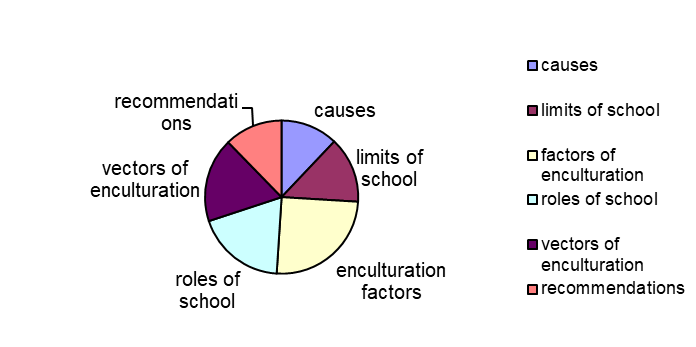
The reports of participants were coded according to the categories of data included in the diagram above. A total number of 439 units of data were processed, and they reviled the status of school as an enculturation factor as perceived by the students as well as the vectors and recommendations students see in order for this status to be preserved and enhanced.
5. Findings
5.1 Data regarding the perceived status of school as an enculturation factor
The general sole of school as the main instance that is responsible with instilling the cultural values is recognised by the participants. At the declarative level, 66 of the participants formulated this idea at least once in their essay. The fact that a significantly higher number of students in exact sciences field included this explicit idea in their paper may be justified by the specificity of their future teaching field which is perceived as requiring more guided teaching and learning.
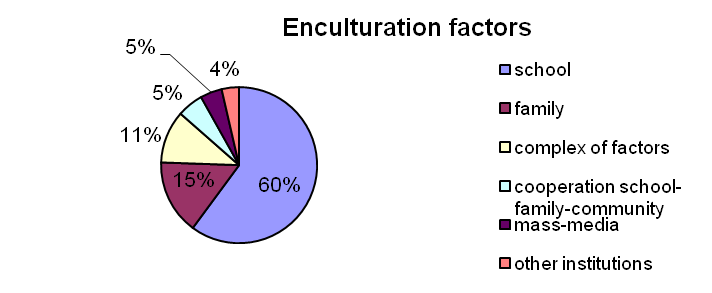
Yet, in the view of the participants, the enculturation role of today school is challenged by the emergence of alternative and complementary educational instances. Table
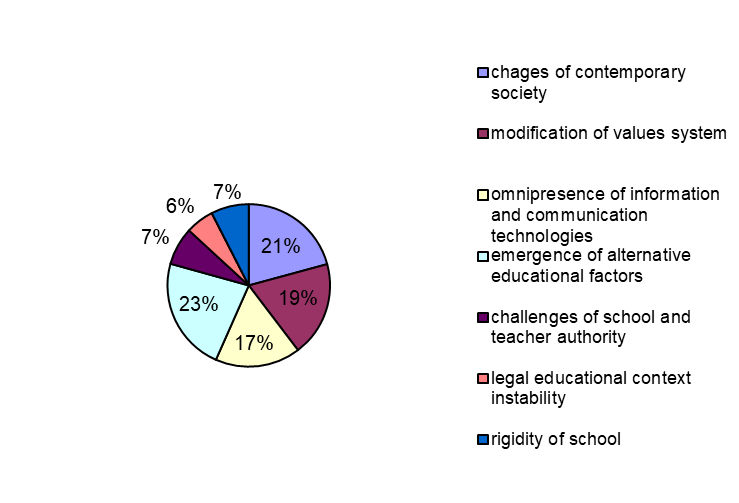
In analysing the internal factors that prevent schools from adapting to the educational expectations of the contemporary society, participants mentioned the drawbacks the Romanian school experience that could prevent the educational system from preserving its prevalent relevance. While being general, these limits reflect school resistance in integrating the perspectives on knowledge that the new contemporary epistemologies promote. School focus on transmitting large amounts of pre-set knowledge in an expositive and unintegrated manner is reflected by the ideas of participants included in the table below:
The high percentage of the participants’ reflections that refer to the limits at the level of teachers and school culture (41%) indicate the fact that in the view of future teachers schools themselves have the responsibility of adapting to the new changes and mutations existing at the level of society and epistemology.
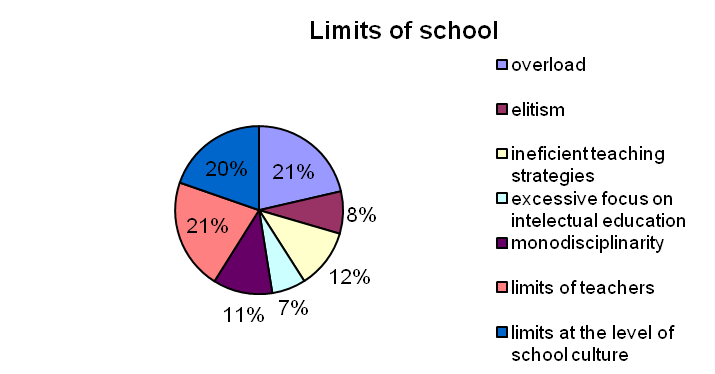
5.2 Data on the specific enculturation roles of school
The participants offered very specific reflections on the educational focuses that would reflect schools’ enculturation roles (table
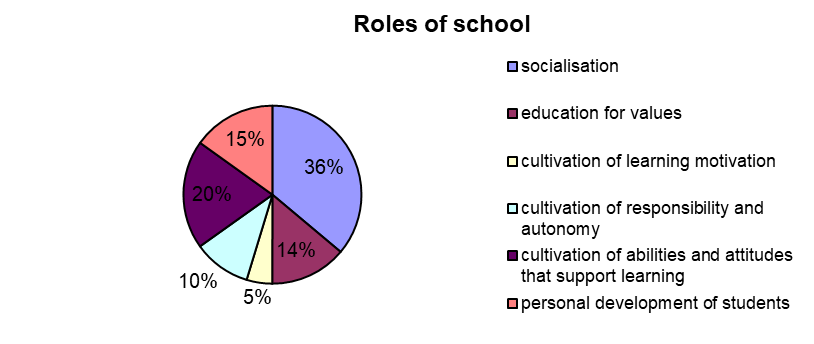
The idea of school that must preserve its main status as an enculturation agent is transparent in the reflections of future teacher students. A large number of respondents’ contributions acknowledged the important role of the teacher in supporting the school in its aims of enculturation (see the first two categories of answers in table
6. Recommendations
The reflection exercise that pre-service students made conducted them to a set of relevant recommendations for enhancing school’s role in the complex process of enculturation. Their overall analysis reflect a tendency for understanding the necessity of changing school culture towards promoting the valorisation of diversity, cooperation, competences training and alternative learning experiences. Here are the categories of suggestions made, ordered hierarchically according to their frequency in students’ answers:
Valorisation of diversity, cultivation of multiculturalism and of differentiated education
Promotion of a professional culture of cooperation (of educational factors)
Modification of accents in initial and continuing training of teachers
Focus on competences training
Focus on personal development
Enhancement of the extracurricular component of the educational programme (voluntary activities, projects, practical learning)
Other recommendations:
focus on work market expectations and requirements
providing of school and career counselling services
training of students for lifelong learning
7. Conclusions
The present study offered a general image existing at the level of pre-service teachers on the school as an enculturation agent. The data collected reflect the idea that contemporary school is challenged by alternative factors of enculturation that are considered important in the configuration of nowadays society and epistemology. The participants actively questioned the classical roles of school and teachers and emphasised the need for educational systems’ adaptation to the rapid changes in educational expectations of society and pupils. The recommendation made for the Romanian school’s changes of vision and focuses are consistent with the one emphasised by other recent national studies and reflect a clear understanding of the necessity for reconsiderations of orientations of the contemporary educational system.
References
- Borich, G. (2011). Effective teaching methods. Research – based practice. 7th Edition, Boston: Pearson Education Inc.
- Dasen, P. (1999). Fundamentele științifice ale unei pedagogii interculturale (Scientific bases of an intercultural pedagogy) in Cucoș, C., Educația interculturală. Experiențe, politici, strategii, Iași: Polirom;
- Cuciureanu, M., Alecu, G., Badea, D., Catană, L., Șerban, M.A., Tarău, I. & Țăranu, M. (2014). Cultura elevilor și învățarea (Culture of students and learning), București: Institutul de Științe ale Educației
- Cucoș, C. (2000). Educația. Dimensiuni culturale și interculturale (Education. Cultural and intercultural dimensions). Iași: Polirom;
- Cucoș, C. (2014). Pedagogie. Iași: Polirom;
- Hativa, N. (2001). The tension between professors’ and students’ perceptions regarding the academic environment. ERIC Publications. ED444431;
- Hattie, J. (2014). Învățarea vizibilă. Ghid pentru profesori (Visible learning for teachers. Maximizing impact on learning). București: Editura Trei;
- Opre, D. (2010). Expertiza didactică universitară (Higher-education didactic expertise). Cluj-Napoca: ASCR;
- Osberg, D. & Biesta, G. (2007). Rethinking Schooling Through the “Logic” of Emergenc: Some thoughts on planned enculturation and educational responsibility. In Bogg, Y. & Geyer, R., Complexity, Science and Society, Abingdon, Oxford: Radcliffe Publishing Ltd. ;
- Segall, M., Dasen, P.R., Berry, J.W. & Poortinga, Y.H. (1990). Human behaviour in Global Perspective. An introduction to cross-cultural psychology. New York: Pergamon;
- Super, C. & Harkness, S. (1986). The Developmental Niche: A Conceptualization at the Interface of Child and Culture. International Journal of Behavioral Development. December 1986 vol. 9, no. 4, 545-569.
Copyright information

This work is licensed under a Creative Commons Attribution-NonCommercial-NoDerivatives 4.0 International License.
About this article
Publication Date
22 December 2016
Article Doi
eBook ISBN
978-1-80296-017-4
Publisher
Future Academy
Volume
18
Print ISBN (optional)
-
Edition Number
1st Edition
Pages
1-672
Subjects
Teacher, teacher training, teaching skills, teaching techniques, special education, children with special needs
Cite this article as:
Glava, C., & Glava, A. (2016). Beliefs of Pre-service Teachers Master Students on School as an Enculturation Factor. In V. Chis, & I. Albulescu (Eds.), Education, Reflection, Development - ERD 2016, vol 18. European Proceedings of Social and Behavioural Sciences (pp. 569-577). Future Academy. https://doi.org/10.15405/epsbs.2016.12.70

